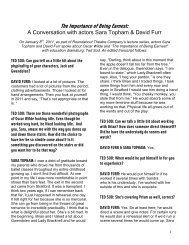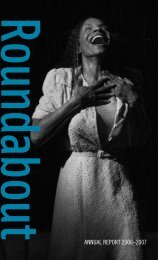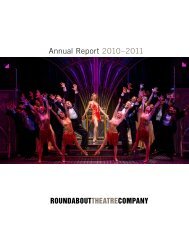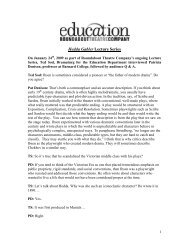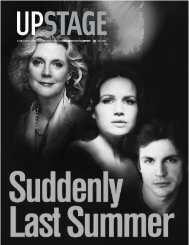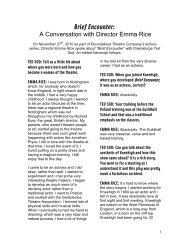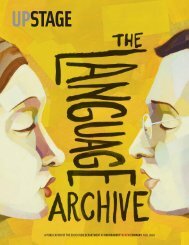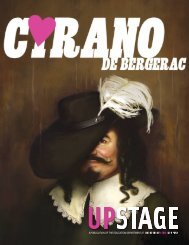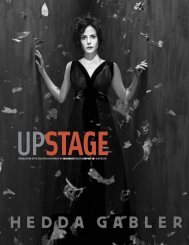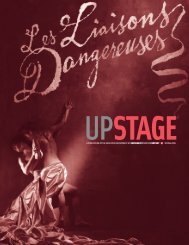The Language of Trees - Roundabout Theatre Company
The Language of Trees - Roundabout Theatre Company
The Language of Trees - Roundabout Theatre Company
Create successful ePaper yourself
Turn your PDF publications into a flip-book with our unique Google optimized e-Paper software.
A PUBLICATION OF THE EDUCATION DEPARTMENT AT ROUNDABOUTTHEATRECOMPANY FALL 2008<br />
UPSTAGE FALL 2008 <strong>The</strong> <strong>Language</strong> <strong>of</strong> <strong>Trees</strong><br />
1
Interview with the Playwright and Director:<br />
Steven Levenson and Alex Timbers<br />
“I think we <strong>of</strong>ten believe that if<br />
we only had the right words we<br />
could reach one another and<br />
come up with some kind <strong>of</strong><br />
understanding.”<br />
Steven, you are the author <strong>of</strong> <strong>The</strong> <strong>Language</strong> <strong>of</strong> <strong>Trees</strong>,<br />
will you give us some background information on<br />
yourself?<br />
SL: I’m from Bethesda, Maryland originally, and then<br />
went to college at Brown University. I began as an actor<br />
in college, and I sort <strong>of</strong> slowly found writing. I took<br />
classes with Brighde Mullins and Paula Vogel at Brown,<br />
and graduated in ’06, then moved to New York basically<br />
to write. I worked at Playwrights Horizons as a literary<br />
assistant until this past June, when I finally left to be a<br />
writer full time<br />
Am I correct in saying you are 23?<br />
SL: 24.<br />
So <strong>The</strong> <strong>Language</strong> <strong>of</strong> <strong>Trees</strong> is your first? Second?<br />
Third play?<br />
SL: It is my first play. It’s my first real play that I<br />
showed to more than just one or two people. I began<br />
writing it in my senior year <strong>of</strong> college, 2005. And I’ve<br />
been working on it since then.<br />
Will you talk a little bit about the inspiration for the<br />
play?<br />
SL: I was saying yesterday that I don’t really remember<br />
what initially propelled the writing <strong>of</strong> it. I remember<br />
that it began with the situation <strong>of</strong> two neighbors from<br />
completely different backgrounds sitting down in one<br />
<strong>of</strong> the women’s homes, and suddenly this story came<br />
out that the younger woman’s husband was <strong>of</strong>f<br />
somewhere else as a translator in a war. And then the<br />
story just kind <strong>of</strong> came in around that. I was interested<br />
in trying to think about what was happening in the<br />
world in terms <strong>of</strong> the war but through the lens <strong>of</strong> this<br />
very small story.<br />
What inspired the character <strong>of</strong> Eben? He’s such a<br />
remarkable young person.<br />
SL: That’s a really good question. I hadn’t even thought<br />
<strong>of</strong> this but I worked at a day care center during high<br />
school, and I worked there a little bit in college during<br />
summer breaks and stuff, so there was a period when I<br />
was around kids a lot. So maybe that’s what partly<br />
inspired it. I don’t know. I just had this idea <strong>of</strong> a kid<br />
who’s really interested in nature and in exploring and<br />
discovering the world.<br />
Is Eben at all like you?<br />
SL: Not really. I wasn’t very into nature as a kid<br />
actually, so no, probably not, unfortunately.<br />
Alex, you are directing the play, how did you and<br />
Steven find each other?<br />
AT: Steven and I found each other through Robyn<br />
Goodman, who’s the artistic consultant and basically<br />
functions as the director <strong>of</strong> the Underground program,<br />
and she’s a fan <strong>of</strong> Steven’s work and my work and had<br />
the vision to put us together and it’s fantastic. We did a<br />
reading together <strong>of</strong> the play in January and then the<br />
play was chosen for programming in April.<br />
Had Robyn seen Heddatron or any other works<br />
you’ve directed?<br />
(Playwright, Steven Levenson)<br />
UPSTAGE FALL 2008 <strong>The</strong> <strong>Language</strong> <strong>of</strong> <strong>Trees</strong><br />
AT: I’m not really sure what she’s seen. She seems to<br />
have her ear to the ground on all sorts <strong>of</strong> creative things<br />
so it’s possible she saw something. Also, Josh Fiedler in<br />
2
her <strong>of</strong>fice has seen work tha my company has done and<br />
work I’ve directed freelance, mostly in the musical<br />
theatre realm. So he’s been a fantastic advocate as well.<br />
Tell me about the play itself. What do you sense it is<br />
about, or is it still evolving?<br />
SL: What I’m really trying to crystallize, and to make as<br />
clear as possible, is how words work and don’t work,<br />
and how these characters come together and fall apart<br />
based on their inability to fully communicate. I think<br />
we <strong>of</strong>ten believe that if we only had the right words we<br />
could reach one another and come up with some kind<br />
<strong>of</strong> understanding. But sometimes words are not<br />
enough, and this idea <strong>of</strong> a perfect language where<br />
everyone understands each other just doesn’t work that<br />
way. <strong>The</strong> play right now is about communication and<br />
miscommunication; or, whatever the opposite <strong>of</strong><br />
communication is.<br />
One thing that struck me is what I call the magic<br />
realism in the play. Am I <strong>of</strong>f base?<br />
SL: No, no. I feel like I started writing plays in the<br />
shadow <strong>of</strong> Sarah Ruhl and Jordan Harrison. Those are<br />
the playwrights I was, and still am, in awe <strong>of</strong>. I try to<br />
write plays that do things magically and theatrically that<br />
you can’t do in a movie or a TV show.<br />
actually right out <strong>of</strong> school. She’s really young and<br />
already she’s done a show at Lincoln Center. So it’s all<br />
just really lucky.<br />
Will there be music per se?<br />
AT: <strong>The</strong>re’s going to be a sonic textural scoring as<br />
opposed to a musical underscoring or a melodic<br />
underscoring. It sounds pretentious when I talk like<br />
that but you know what I mean.<br />
What traits were you looking for in the actors when<br />
you were casting this?<br />
AT: Well, we were looking for people who were<br />
incredibly honest, incredibly accessible. We were<br />
talking today about how we don’t want to tip into<br />
sentimentality and that could happen on a show that’s<br />
so fragile and so poetic, so we were looking for actors<br />
who had a sense <strong>of</strong> humor and who were able to make<br />
positive choices. I’ve never worked on a show that’s so<br />
intimately performed. I think the acting style is going<br />
to feel somewhat unique.<br />
That brings us to the director’s vision I wondered<br />
how it would work in the Underground space.<br />
AT: It’s quite a complicated task to render a show with<br />
so many locations and so many strong visual metaphors<br />
in a space that is essentially a large room with low<br />
ceilings. One <strong>of</strong> the things I’ve found lucky about this<br />
process is being able to work with the designers I really<br />
wanted to work with. Robyn trusted us to choose our<br />
collaborators in this process. Cameron, our set<br />
designer, in particular, has a strong history in working<br />
in magical realism; working on Jose Rivera plays. She’s<br />
primarily an opera designer, and I think that on a show<br />
like this, she is a really great person to have involved.<br />
When we do shows together, the aesthetic is<br />
simultaneously beautiful and disgusting. We<br />
incorporate things that look like detritus and stuff<br />
that’s in disuse but is really beautiful at the same time. I<br />
just feel like we’ve really lucked out too with the<br />
lighting designer, David Weiner. To me, he has the<br />
same beautiful and disgusting aesthetic and is<br />
incredibly painterly and through <strong>Roundabout</strong>’s<br />
generosity has some pretty cool tricks up his sleeve.<br />
<strong>The</strong> sound designer, M.L. Dogg, is someone who thinks<br />
in terms <strong>of</strong> real soundscapes and industrials. He’s not<br />
what I think <strong>of</strong> as a normal sound designer. He’s also an<br />
engineer. And then there is Emily Rebholz, the<br />
costumer. I’ve done nine shows with her now. She’s<br />
(Director, Alex Timbers)<br />
UPSTAGE FALL 2008 <strong>The</strong> <strong>Language</strong> <strong>of</strong> <strong>Trees</strong><br />
3
And in casting Gio, who is an adult actor playing a<br />
seven year old, which is called for in the script, was<br />
there a specific thing you needed for him?<br />
AT: I think we were so lucky to find Gio. <strong>The</strong> part<br />
demands an innocence and a certain kind <strong>of</strong> pain. <strong>The</strong><br />
character is somehow wounded on the inside from the<br />
very beginning, and there’s something about Gio that’s<br />
just so warm and open, and yet there’s also something<br />
very fragile and possibly dangerous or sad about him.<br />
He was just perfect when he came in. You believed him.<br />
He wasn’t playing at the part, he was fully inhabiting it.<br />
It was really lucky to find him.<br />
Can you tell us something about your vision?<br />
AT: To me what’s essential to the play is this idea <strong>of</strong><br />
loss and what it takes to move beyond loss and grief.<br />
What we’ve tried to do scenically is create three<br />
different spaces, three different areas, and there is this<br />
tree that reaches through all these areas to connect<br />
them. Hopefully, it will be the big visual metaphor that<br />
lands at the end. Cameron has had a cool idea <strong>of</strong> a kind<br />
<strong>of</strong> vessel <strong>of</strong> a tree. She’s taken the hugging tree and<br />
related it to the sand so it’s a tree that fills with sand<br />
and the sand filling the tree is something that is used as<br />
a form <strong>of</strong> communication. It is the murmuring, but it’s<br />
also a suffocating gesture.<br />
possibilities open and be receptive to trying any<br />
different opportunity in the theatre. Seeing as much<br />
theatre and being around actual pr<strong>of</strong>essional theatre is<br />
the best thing you can do as a young person.<br />
SL: Working at Playwrights Horizons for a year and a<br />
half was invaluable because all I did was read plays all<br />
day long. I had to leave that job ultimately because it<br />
became hard to try to create work and also evaluate it in<br />
a critical way. But reading plays and seeing plays are<br />
just so important. Just being around other people and<br />
being part <strong>of</strong> the conversation. Learning where you fit<br />
in and getting to see all sorts <strong>of</strong> things like Hell House<br />
at St. Anne’s Warehouse and then going to see<br />
something at <strong>Roundabout</strong> or on Broadway. It’s<br />
important because you see the kind <strong>of</strong> work you want to<br />
be doing and you also see if the kind <strong>of</strong> work you want<br />
to do isn’t there yet.<br />
SL: I should also say when I’m writing I don’t think<br />
about the stage itself. I don’t have a very proprietary<br />
sense <strong>of</strong> what I need it to look like. Part <strong>of</strong> what’s so<br />
exciting, about Alex specifically, is he has such a visual<br />
sense. I just love handing it over to Alex and the<br />
designers and seeing what they come up with.<br />
AT: And if this show is successful, it will receive many<br />
productions all around the United States, just as is<br />
happening with Speech and Debate. And I’m sure no<br />
one will stage the show the way we’re staging it here. I<br />
mean this show is so open to many different visual<br />
interpretations. It’s going to be thrilling to see those<br />
other productions.<br />
(Actors; Michael Warner and Michael Hayden)<br />
We have a lot <strong>of</strong> young people participating in our<br />
education programs who want to write and direct.<br />
What would you say to a high school or middle<br />
school student who had those aspirations?<br />
AT: See as much work as you can, and intern at as many<br />
theatres and nonpr<strong>of</strong>its and things like that. My first<br />
job out <strong>of</strong> college was interning at the Manhattan<br />
<strong>The</strong>atre Club. I knew I wanted to be involved somehow<br />
in theatre, but I thought possibly as an actor or as an<br />
administrator, and then I decided to be a director. It<br />
didn’t mean that any <strong>of</strong> the work I had done trying to be<br />
an actor was down the drain. Just keep all the<br />
UPSTAGE FALL 2008 <strong>The</strong> <strong>Language</strong> <strong>of</strong> <strong>Trees</strong><br />
4
Interview with the<br />
Actor:<br />
Gio Perez<br />
Can you tell us how you are going to prepare to play<br />
Eben, who is seven years old?<br />
I definitely, 100%, plan on hanging out with a sevenyear-old<br />
from now until we start previews on the 4th. I<br />
also have a couple <strong>of</strong> child psychology books I’ve been<br />
peeking at, but the key thing about this character is that<br />
he’s not really your average seven year old which makes<br />
it a little easier. He’s an extremely smug little man,<br />
incredibly intuitive, and I really like to think that<br />
there’s something extraordinarily special about him.<br />
He’s very human, very much like an adult in a way. I<br />
want to make it as truthful as possible. I used to baby sit<br />
a seven-year-old boy who was very precocious and I<br />
always found it interesting because he always looked<br />
uncomfortable in his body. <strong>The</strong>ir expressions are<br />
usually not very easily hidden so you can kind <strong>of</strong> sense<br />
how they feel. I’m having a lot <strong>of</strong> fun so far figuring out<br />
where he lives in his body.<br />
Can you tell me how this is different from other<br />
roles you’ve played?<br />
Oh my gosh, so incredibly different. It’s definitely new.<br />
Unfortunately, I’ve had to play characters that are very<br />
evil. I’ve been dying to play a character that is not like<br />
that and Eben is not evil at all. As soon as I got my<br />
hands on the script, I was in love with the character. It’s<br />
something I want to dig my teeth into. I think I have a<br />
lot in common with Eben, so it’s making it kind <strong>of</strong> easy<br />
so far. I’m definitely excited.<br />
How is the role in the play personally relevant to<br />
you? What resonates for you personally in the play<br />
and in the character?<br />
Things that I really love and cherish I think Eben does<br />
as well. I constantly go to Central Park. If I don’t go to<br />
Central Park at least twice a week I start craving it. So I<br />
understand his love <strong>of</strong> nature and the love he has for<br />
his parents. I think he has inherited both <strong>of</strong> his<br />
parents’ finest qualities. His mother is very caring and<br />
Eben is very caring and very sensitive. And his father is<br />
very much <strong>of</strong> an intellectual and Eben is as well. For<br />
me, my dad was always very funny and my mom was<br />
always responsible and those were good qualities for<br />
me to inherit; so in that respect I feel very similar to<br />
Eben. I was also an only child and I did play alone all<br />
the time. When I was in preschool up into the second<br />
grade, I lived in the suburbs and I had a big backyard<br />
and every day I would be exploring in my backyard<br />
which is almost exactly like Eben. Looking for stuff,<br />
digging holes, collecting spiders under the porch,<br />
climbing trees, collecting rocks and shells and getting<br />
my hands on every type <strong>of</strong> bug there ever was, any bit <strong>of</strong><br />
nature I possibly could.<br />
Do you have a sense <strong>of</strong> what the play is about at this<br />
point in your process?<br />
I do. <strong>The</strong> play has a lot to say; especially politically.<br />
<strong>The</strong>re’s something in the play about how a simple little<br />
family can be torn to shreds by something so far away<br />
like a war. And there’s something about words not<br />
being enough for communication.<br />
How did you become an actor and what type <strong>of</strong><br />
training did you have?<br />
I started acting by mistake in high school, just being a<br />
go<strong>of</strong>y kid. I went to a smaller high school and they had<br />
this event at the end <strong>of</strong> the year called the School<br />
Olympics where they would divide the school up into<br />
three teams and they had this one event called the<br />
Gongless Gong Show and I <strong>of</strong>fered to do it. You had to<br />
pick a song out <strong>of</strong> the hat which you had to prepare to<br />
lip sync. I picked “<strong>The</strong>se Boots Were Made for<br />
Walking” by Nancy Sinatra. My mom bought this little<br />
mini skirt and I dressed in drag and I performed the<br />
song and won. I realized it was kind <strong>of</strong> fun being in<br />
front <strong>of</strong> the entire school, being a go<strong>of</strong>y guy. And the<br />
theatre director approached me and asked me to<br />
audition for one <strong>of</strong> the school plays and I was cast as<br />
Seymour in Little Shop <strong>of</strong> Horrors. I just really just fell<br />
in love with it. I wasn’t sure this is what I wanted to do,<br />
but with the support <strong>of</strong> my friends and family, I applied<br />
to NYU and I got in. I studied at the experimental<br />
theatre wing which I absolutely loved with all my heart.<br />
UPSTAGE FALL 2008 <strong>The</strong> <strong>Language</strong> <strong>of</strong> <strong>Trees</strong><br />
5
“<strong>The</strong>re’s something in the<br />
play about how a simple little<br />
family can be torn to shreds<br />
by something so far away<br />
like a war.”<br />
<strong>The</strong> pr<strong>of</strong>essors there really love what they do and it was<br />
an ideal place to find my physical approach to acting. It<br />
was a really safe environment to figure out if this was<br />
what I wanted to do.<br />
When did you graduate?<br />
About two years, ago in May 2006.<br />
And you’ve been working since then?<br />
I have. I’ve been very, very lucky. 90 % <strong>of</strong> all my work<br />
the last two years has been in films, television,<br />
commercials or the theatre.<br />
I would tell them that they have to make sure that they<br />
love it. That’s really what it is. Because if you don’t love<br />
it and you are doing it for some other reason, it’s not<br />
going to fill you up. It’s got to piece your soul together.<br />
If you are out for money or you’re out to be famous--<br />
it’s not about any <strong>of</strong> those things really. <strong>The</strong> thing about<br />
this business, I think, is that a lot <strong>of</strong> times you get really<br />
lucky in meeting other artists and they teach you so<br />
much. It’s a really awesome field to get into but you<br />
definitely have to love it…yeah.<br />
Gio, is there any question that you wish I had asked<br />
that I haven’t asked?<br />
Yeah, how do I feel about all the people I met so far who<br />
are involved with the show and with <strong>Roundabout</strong>? I<br />
think they’re all freaking amazing! Alex is so cool and<br />
smart and calm and Steven is just so warm and the<br />
other actors are so talented and everybody I’ve met so<br />
far is so great. It just seems too good to be true. I feel<br />
blessed, I really do.<br />
What advice would you give to a middle school or<br />
high school student who wants to be an actor?<br />
(Gio Perez in a scene from <strong>The</strong> <strong>Language</strong> <strong>of</strong> <strong>Trees</strong>)<br />
UPSTAGE FALL 2008 <strong>The</strong> <strong>Language</strong> <strong>of</strong> <strong>Trees</strong><br />
6
Interview with the Set Designer:<br />
Cameron Anderson<br />
“I always start each process by<br />
finding images that tell the<br />
metaphorical story”<br />
tree that reveals itself for the first time in that moment<br />
when the tree lights up.<br />
When you say the set wraps around the audience,<br />
does that mean the action will happen all around<br />
the audience or is it contained?<br />
Tell us a bit about the challenges <strong>of</strong> designing this<br />
play <strong>The</strong> <strong>Language</strong> <strong>of</strong> <strong>Trees</strong>, and how you went about<br />
dealing with those challenges.<br />
<strong>The</strong> main challenge <strong>of</strong> designing this play is really the<br />
size and shape <strong>of</strong> the theatre. It’s very small and has an<br />
unconventional amount <strong>of</strong> space and the play is so vast<br />
in its imagery and calls for really evocative magical<br />
events. <strong>The</strong> play is filled with wonderful visual images<br />
that are a dream for me to encounter because I love<br />
figuring out how to resolve those challenges in<br />
transformative ways. <strong>The</strong> difficultly is that when you’re<br />
in a really intimate theatre and the audience is very<br />
close to the tricks that your trying to use, you have to<br />
come up with solutions that work in different ways than<br />
they would in a big proscenium theatre. Here you have<br />
to be very honest about everything. We’ve reoriented<br />
the theatre in a different configuration than it was used<br />
for Speech and Debate. We’ve created this wonderful<br />
wrapping around <strong>of</strong> the scenery so the audience is<br />
really surrounded on all sides by the set. We took the<br />
image <strong>of</strong> the tree and the sand and we’ve combined<br />
those two images to create a metaphorical through line.<br />
It’s a little bit <strong>of</strong> both. People are not swirling around<br />
the audience. It’s sort <strong>of</strong> 180 degrees not 360 degrees.<br />
We’re also trying to integrate the existing elements <strong>of</strong><br />
the theatre, so that when you come in, you really feel<br />
like you are immersed in the environment. It’s a way to<br />
embrace the intimacy.<br />
Can you tell us how the play has relevance for you?<br />
It is a beautiful play that is relevant to everyone because<br />
it’s about the Iraq war. In that way it’s political, but it’s<br />
not written in a way that’s overtly political. Its really a<br />
story <strong>of</strong> loss and how you one day wake up and have<br />
something happen to you that is the worst thing you<br />
could ever imagine and how you pick up the pieces.<br />
Do you want to tell us about how the specific images<br />
actually work?<br />
I always start each process by finding images that tell<br />
the metaphorical story. And they might be images that<br />
end up having nothing to do with the play. <strong>The</strong>y may not<br />
be images <strong>of</strong> Iraq or <strong>of</strong> a kitchen, but for this play,<br />
they’re images that tell a story <strong>of</strong> something beautiful<br />
and disturbing at the same time. I had an image <strong>of</strong> sand<br />
falling in a translucent tree in my mind when I read the<br />
play the first time; an image <strong>of</strong> beauty and suffocation;<br />
an image <strong>of</strong> a glass tree slowly filling up with sand;<br />
which supports the idea <strong>of</strong> Iraq and all <strong>of</strong> the imagery <strong>of</strong><br />
sand in your mouth -- and the stifling <strong>of</strong> emotion that<br />
happens when tragic things happen to people. <strong>The</strong><br />
translucent tree murmurs and speaks and then lights<br />
up in this very magical way and splits with its<br />
magnificent light. <strong>The</strong> sand falling is a part <strong>of</strong> the<br />
murmuring and there’s a crystalline wall behind the<br />
(Natalie Gold, Gio Perez, and Maggie Burke)<br />
It’s about how humans have the extraordinary ability to<br />
move on in the face <strong>of</strong> terrible tragedy. It’s about<br />
family, so it’s very moving to me. It’s something anyone<br />
will be moved by whether you are for or against the Iraq<br />
war because it’s about loss and that’s something that<br />
anybody can connect to.<br />
Could you tell us how you came to be a designer and<br />
any advice you would give to students in middle or<br />
high school who would like to do the type <strong>of</strong> work<br />
you are doing.<br />
UPSTAGE FALL 2008 <strong>The</strong> <strong>Language</strong> <strong>of</strong> <strong>Trees</strong><br />
7
I had a very interdisciplinary education. I was an<br />
English major in college and studied fine arts and art<br />
history and literature. I went to Wesleyan University.<br />
My senior year <strong>of</strong> college I discovered scenic design. I<br />
had gone to the opera and theatre growing up but was<br />
thrilled to find a pr<strong>of</strong>ession that brought together many<br />
<strong>of</strong> things I was passionate about. It brings together<br />
textual analysis, fine arts, architecture, and installation<br />
art into this one medium that is very gratifying because<br />
it’s created so quickly. If you are an architect your work<br />
lasts forever hopefully, but it takes ten years for it to<br />
arrive into existence. <strong>The</strong> beauty <strong>of</strong> being a set designer<br />
and working with theatre artists is that we create these<br />
worlds and they only last as long as the audience is<br />
there to appreciate them. So there’s this sort <strong>of</strong><br />
communion. It only has meaning when there is a play<br />
happening within it. And it’s magical in that way. <strong>The</strong>n<br />
it all gets trashed and thrown out and it only exists in<br />
the memory <strong>of</strong> the people who witnessed it, which I<br />
think is really beautiful.<br />
Where did you go to grad school?<br />
<strong>The</strong> College- Conservatory <strong>of</strong> Music in Cincinnati. I<br />
got my MFA in set design there. It has wonderful opera,<br />
musical theatre, and drama departments<br />
Would you suggest graduate school to young people?<br />
I would, but I would advise anybody who wants to<br />
become a set designer that it’s very important to learn<br />
about everything else outside <strong>of</strong> theatre before you<br />
focus in on theatre. Because really, you need a sense <strong>of</strong><br />
history, a sense <strong>of</strong> art history, you need a sense <strong>of</strong> the<br />
world in order to bring that world to the stage. I actually<br />
highly recommend a liberal arts undergraduate<br />
education for set designers as opposed to a<br />
conservatory education. I think grad school was very<br />
important for me because I had very little practical<br />
experience. I didn’t study theatre in undergrad and I<br />
needed to design a lot <strong>of</strong> shows that were put up in an<br />
environment where you can take risks and make<br />
mistakes and discover yourself.<br />
Can you talk about people or places that inspire<br />
you?<br />
I get inspiration from many varied sources. I get<br />
inspiration from fine arts, film, I go to a lot <strong>of</strong><br />
museums. A lot <strong>of</strong> installation art. I try to expose myself<br />
to as many different art forms as I can. Going to the<br />
theatre is also really important. I love Christian<br />
Boltanski, who is an installation artist. Rebecca Horn is<br />
another artist I love. In terms <strong>of</strong> designers, there are<br />
some Eastern European designers I really love. Ralph<br />
Koltai would be my favorite. I try to immerse myself in<br />
as many varied viewpoints as I can and see what I find.<br />
For more information about<br />
<strong>Roundabout</strong> <strong>The</strong>atre <strong>Company</strong>’s Education Department, please visit our website,<br />
http://www.roundabouttheatre.org/education.htm ,<br />
or email us at education@roundabouttheatre.org.<br />
Education Department: Greg McCaslin Education Director; Reneé Flemings<br />
Director <strong>of</strong> Instruction and Curriculum Development; Jennifer DiBella Education<br />
Program Manager; Jay Gerlach Education Associate for <strong>The</strong>atre-Based Programs;<br />
Amanda Hinkle Education Associate for School-Based Programs; Aliza Greenberg<br />
Education Coordinator; Ted Sod Education Dramaturg; Kayla Carpenter Education<br />
Intern; Emily Meagher Education Intern<br />
UPSTAGE FALL 2008 <strong>The</strong> <strong>Language</strong> <strong>of</strong> <strong>Trees</strong><br />
8



